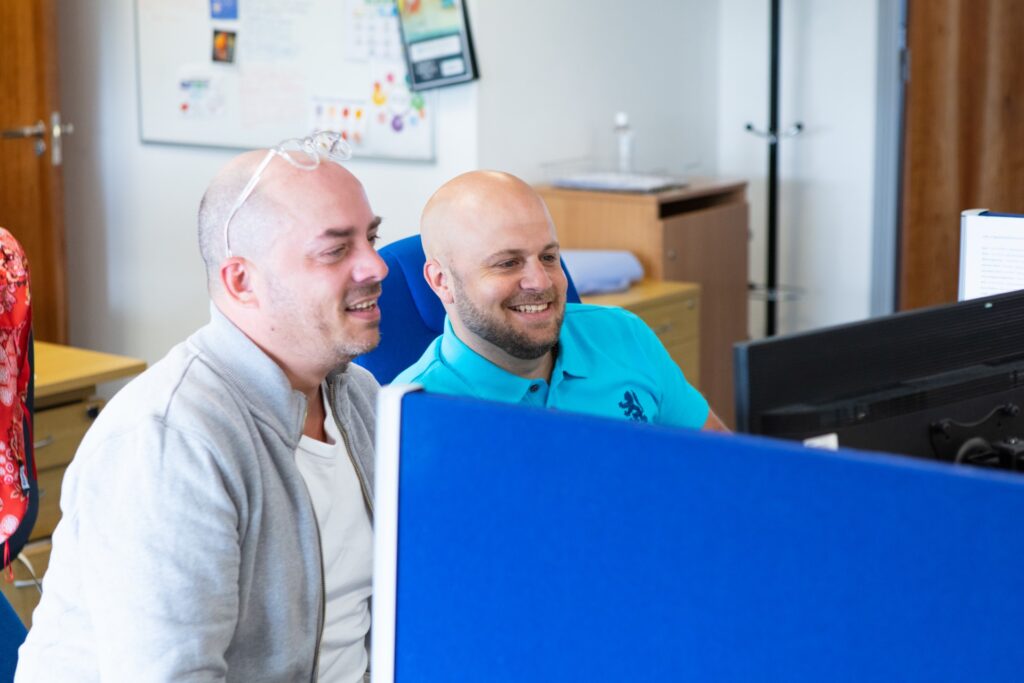We all know that work isn’t just about completing the tasks at hand. It’s about collaborating and sharing ideas, connecting with customers and doing great things for both your own development and for the needs of the business.
People aren’t robots. We don’t just turn on and work the 9-5, before switching off immediately for the rest of the day. Employees should be passionate about the work they do and driven by the people around them to succeed. That’s why it’s so important to develop a workplace culture that prioritises its people and encourages employees to connect and socialise with one another.
The benefits of good workplace relationships
Studies show that around 35% of colleagues are considered friends, with just 15% of these friendships continuing out of work hours. Half of these friendships form within weeks of meeting which shows the real value of instant connections with our colleagues.
Research by LinkedIn found that 46% of people believe having friendships at work boosts overall happiness. Further research suggests great relationships at work improve the work we do, boost productivity, enhances innovation and increases engagement.
Most of us spend way over 35 hours of our time each week at work. Workplace relationships are hugely influential for how we feel about our job. We all need a support system, and this is just as important in work as it is out of it.
Businesses have noticed the benefits to productivity and job happiness good workplace relationships brings. Companies have been employing ways to encourage employees to foster relationships. Social events both in and outside of work, networking groups and company communication tools such as Slack or Teams helps employees connect and build relationships. This is particularly important for workplaces with a number of different departments, many of which don’t overlap. There are potential friendships running throughout the business – employees just need the chance to meet new people.
Are your colleagues becoming a second family?
It’s important to keep work life and home life separate – even if you’re technically in the same physical space throughout the day.
One of the biggest concerns around the popularity for working from home with other members of your family is how to know when work begins and ends. It’s easy to start early, work late and even take longer breaks during the day to carry out “life admin” tasks if needed. It’s important to continue to stick to a routine, even if you’re working from home. Establish a consistent alarm time, breakfast and lunch times and when your latest cut off point is for working. This will keep you on track and make sure everyone in your household knows the routine – thus taking the stress out of potentially conflicting schedules.

How to manage a work life balance
Suddenly you’re surrounded by a whole new set of colleagues – but they’re the exact same people you’re seeing every morning, every evening and at weekends too. Set boundaries and clear goals. Plan your working day together as you would an in-house team. If one of you has a call scheduled and needs a quiet space to concentrate, make sure the rest of your family is flexible and accommodating.
Work in different spaces if possible, but take time to check in on one another as you would a colleague. This doesn’t mean a lengthy chat, but it’s always better to brainstorm an idea or air a concern rather than bottle things up throughout the day.
If you work from home, keep in touch with your work friends via video calls and messages. Sure, you’ll speak to them throughout the day on work-related matters, but don’t neglect to ask them how they are and have a chat outside of work too. Maintaining our friendships and relationships during the pandemic is so important, so don’t allow yourself to become isolated from the people you’re used to chatting with throughout the working week.
Working in the workplace appears to be more beneficial
Blurring the lines between your professional and personal lines can impact your productivity and overall state of happiness. Professor Nicholas Bloom, a leading researcher into the benefits and potential pitfalls of working from home, explained that, while it may seem on the surface that working from home boosts productivity, the evidence of distractions from family life and day-to-day tasks, increased isolation and lack of collaboration has shown to spell disaster for an employee’s productivity.
Whether it’s idle chats with your co-worker in your office, conflicts with a colleague at work or a discussion with your spouse about your dinner plans, our working relationships can hinder how well we perform. It’s more important than ever to look after our own manageable wellbeing. Improving our stress management, empathy and the way we communicate with one another is imperative to developing and maintaining meaningful connections.
How to manage conflict at work
In office environments there’s bound to be a degree of conflict or stress which impacts relationships with the people around you.
Learn to manage your own stress and anxiety in the best way possible. Perhaps you need to talk about your concerns in order to find a solution, or maybe you manage stress best by removing yourself from the situation for a while. Many people often find mindfulness techniques helpful in calming the mind.
Listen to the other person’s viewpoints and repeat back key points to demonstrate you’ve understood their opinions clearly. Together, come to a resolution – a clear and practical plan to resolve conflict. However small the conflict may seam, it’s important to find a way to improve the situation. Make sure both parties follow through and work together to find a solution. Whether you’re at work with colleagues or working from home with your family, never let a situation escalate and always try to find a positive way to resolve an issue. This will help to avoid relationships and friendships from deteriorating, and may even strengthen them.
How businesses can help build workplace relationships
A healthy and happy employee is more likely to be productive, loyal to the business and engaged throughout the work day. So it’s safe to say that building great relationships and ensuring a healthy working environment is key to business success as well as personal happiness.
Simply instructing people to ‘look after their own wellbeing’ and ‘support one another’ isn’t enough. The questions are endless: Where do I start? What is wellbeing? How can I better manage my stress? Where do I turn for support?
That’s where external wellbeing providers, such as We Are Wellbeing, come in. Businesses can’t be all things to all people. Senior leaders have enough on their plate, and not everyone can be a wellbeing expert. Our team knows how to help employees and empower them to better manage their own health and wellbeing and look after their relationships both in and outside of work. From management training through to employee seminars, giving employees practical tools and takeaways to help them be their best is an effective way to boost productivity and enhance workplace relationships.







